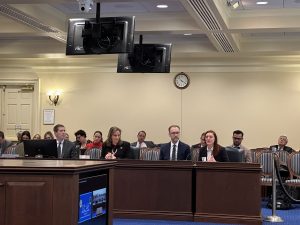
Clara Summers (right) testifying in Maryland in February
Our electric bills are affected not just by a local utility, like ComEd or Ameren Illinois, but also by large power grid operators with funny names like “PJM” and “MISO.” That’s why CUB launched a campaign called Consumers for a Better Grid.
The campaign’s mission is to hold grid operators, also called Regional Transmission Organizations, or RTOs, “accountable to consumers, states and a clean, affordable energy future.”
RTOs manage the flow of electricity over transmission lines–the complex network of high-voltage power lines that carry energy long distances from power plants, across states and regions, and eventually to local distribution systems that serve our homes. RTOs also manage wholesale electricity markets, including running auctions that set prices for reserve energy, called “capacity.” Illinois is served by two RTOs: the PJM Interconnection and the Midcontinent Independent System Operator (MISO).
“Even though many people have not heard of these RTOs, the policies they set have a significant impact on how clean, reliable and affordable our electricity is,” said Clara Summers, manager of the Consumers for a Better Grid campaign.
“Transmission is the fastest growing portion of our electric bills,” she said. “We need more transmission, but it needs to be well-planned. The better RTOs plan, the more efficient and cost-effective our transmission system will be. Right now, RTOs are making decisions that are driving up costs, slowing our climate progress, or potentially reducing electric reliability. That’s why we need to care about them.”
But often the decisions RTOs make are unknown to the public, and in PJM’s case, the process is shrouded in mystery. PJM is the largest grid operator in the country, covering 65 million electric customers from ComEd territory in northern Illinois all the way to the East Coast. Managing the grid is an essential service–PJM has the power of a government. But it’s run like a private corporation, with board meetings behind closed doors.
While consumer advocates do get to vote on PJM policies, voting on policies is dominated by big electricity generators, transmission companies and electric utilities, such as ComEd–and many of those votes are secret. (CUB is trying to change that–read about our campaign for HB 4747.)
“I first heard about PJM because its policies were preventing states from meeting their clean energy requirements,” Clara said. “States should be able to implement clean, affordable energy laws without being undermined by a grid operator.”
 Clara, who grew up on a rural island in Washington state where it wasn’t unusual for the power to go out, has a long track record of fighting the good fight. Her resume includes a year in Indonesia as a Fulbright English Teaching Assistant, as well as stints with Interfaith Power & Light, a group that works with faith communities to take climate action, the environmental law nonprofit Earthjustice and the National Caucus of Environmental Legislators.
Clara, who grew up on a rural island in Washington state where it wasn’t unusual for the power to go out, has a long track record of fighting the good fight. Her resume includes a year in Indonesia as a Fulbright English Teaching Assistant, as well as stints with Interfaith Power & Light, a group that works with faith communities to take climate action, the environmental law nonprofit Earthjustice and the National Caucus of Environmental Legislators.
When not deep in the weeds of energy policy, she enjoys Irish dance, hammered dulcimer–and she also fosters sometimes cantankerous kittens.
“If you had asked me a few years ago whether I cared about transmission, I would have given you a blank stare,” Clara said. “It really hadn’t come across my radar. But the deeper I’ve burrowed into the energy policy machine, the more I’ve realized how fundamental working with RTOs is to achieving our climate goals and clean, affordable energy. In a different world, I wouldn’t work on climate issues at all. But climate change affects everything I care about, and RTOs are in a position to make or break our collective climate progress, so it’s where I feel I need to be.”
To learn more…
- Check out Consumers for a Better Grid’s revamped website, ForABetterGrid.org, and watch our video to learn more about how we’re fighting for consumer interests at the grid level.
- Read Clara’s recent blog article: CUB explainer: Who pays for transmission lines? Take a look at your power bill
- Read our explainer: What are capacity markets?

